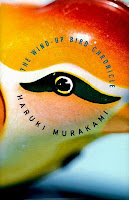Freedom by Jonathan Franzen

This September my book group delved into Jonathan Franzen’s Freedom, a saga of the Berglund family, Patty and Walter, the not-so-happily married parents of two children, and the family’s best friend, Richard, an iconoclastic musician who has remained somewhat spectacularly unmarried. Walter, an environmental lawyer becomes obsessed with an idealistic crusade to save the Cerulean Warbler (hence the cover image), swaths of land from development and to alert America to the ticking overpopulation bomb. All the while, as his relationship with his wife spirals downward, we wonder if the couple can save their marriage, much less the planet. As the marriage implodes, Patty, an ex-college sports star, loses her bearings while pursing perfection in her role as mother and wife. Freedom was up for many literary awards in 2010 and was the author’s first novel since The Corrections, published almost a decade ago.
Franzen: The Author
Interested in the authors that Franzen admires? The major literary influences on his work, his readings, marriage, and his journey from budding college physics major to novelist? Not to mention the role that smoking and earplugs have played in his creative life? You have to take a look at the recent interview he gave to the Paris Review.

I was fascinated that Franzen started out at Swarthmore College as a physics major, taking only one English class in his first three years! He made a dramatic switch midstream to German studies and was profoundly influenced by his readings in that language. In the Paris Review,

Franzen makes special mention of various authors and novels that have influenced him. He has a particular fondness for his study, as a German student, of Rilke’s The Notebooks of Malte Laurids Brigge. Reading The Notebooks, Franzen discovered that “I had an interior life I’d previously known nothing about…” Rilke’s tale about a young boy, Malte, who in the course of rummaging through an old trunk of party masks and trying on various ones, almost becomes unhinged at seeing in the mirror his masked self. What terrifies Malte is the fear that there is no real, authentic self, only a succession of masks. For Franzen, this is the pivotal moment where literature begins to posit that a personality is a construct – a collection of masks – social, linguistic, historical, genetic. These masks and what lies beneath fascinate Franzen.
I also discovered from the interview some of the novels that Franzen loves and that just naturally spring up in his conversation: Murakami’s The Wind-Up Bird Chronicle, The Trial by Kafka, The Players by Don DeLillo, The Brothers Karamazov by Dostoevsky, and, not to leave out women authors, the works of Flannery O’Connor, Christina Stead, Jane Smiley, and Paula

Fox.
Franzen also recommended some of his favorite overlooked reads on the online site The Daily Beast. One of his picks is Ms. Hempel Chronicles by Sarah Shun-lien Bynum. This is a series of
eight connected stories about a young middle school teacher, Ms Hempel, her travails at school, her childhood and how it touches on her life as a teacher. In Franzen’s words this novel-in-stories “albeit beautifully written, distinctively voiced, deeply smart, and very funny” reveals itself as a “complete, organic novel about a love like none I’ve ever read about before…”
- Karen S.




Comments
Post a Comment